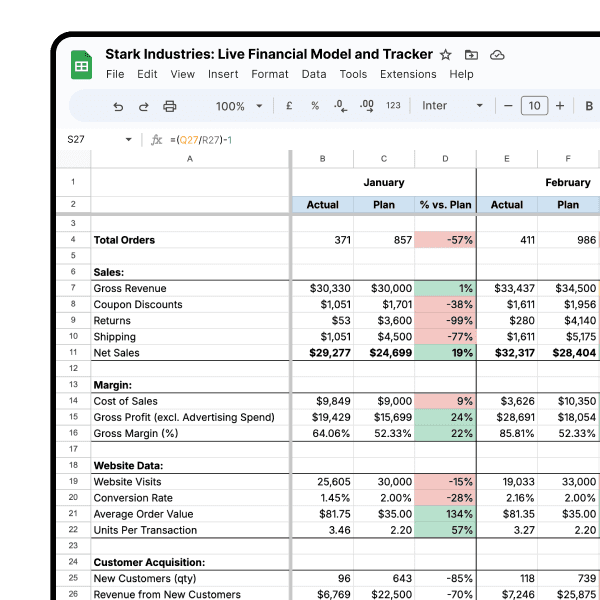Growth Strategies
16.02.2023
TLDR
To improve customer retention and increase customer lifetime value in your Shopify store, you can implement a customer loyalty program, personalize the customer experience, provide excellent customer service, offer special promotions, and engage with customers across channels. Additionally, tracking your Customer Lifetime Value (LTV) is crucial to measuring the effectiveness of your strategies, which can be done manually or automatically with tools like Airboxr.
If you are a business owner, you already know that repeat customers are key to success. It costs less to retain an existing customer than acquire a new one—as the cost of acquiring new customers keeps hitting the sky, the importance of customer retention also keeps increasing.
Repeat customers spend up to 67% more during their lifetime than a customer that purchases only once. Bain & Co.
But what are some tangible steps you can take to get your existing customers to keep coming back? How can we increase their customer lifetime value and customer retention rate? There is no silver bullet to make this happen, but here are five action-steps you can take right now to improve your repeat purchase rate and build a community of loyal customers.
Offer a customer loyalty program
Loyalty programs in e-commerce give customers rewards for buying from the same brand or store multiple times. Rewards can include points, discounts, or special promotions. Loyal customers can collect these rewards and use them to get products or services from the store.
Customer loyalty programs can be designed in various ways, such as a points-based system where customers earn points for every purchase they make, or a tiered system where customers can progress through different levels based on the amount they have spent.
Popular loyalty apps on the Shopify App Store Smile, Yotpo, and Growave. These offer various features and customization options, and integrate easily with Shopify, allowing merchants to manage and track their loyalty program's success.
Shopify has a wide range of loyalty apps to help you get started quickly, as seen in the screenshot below:
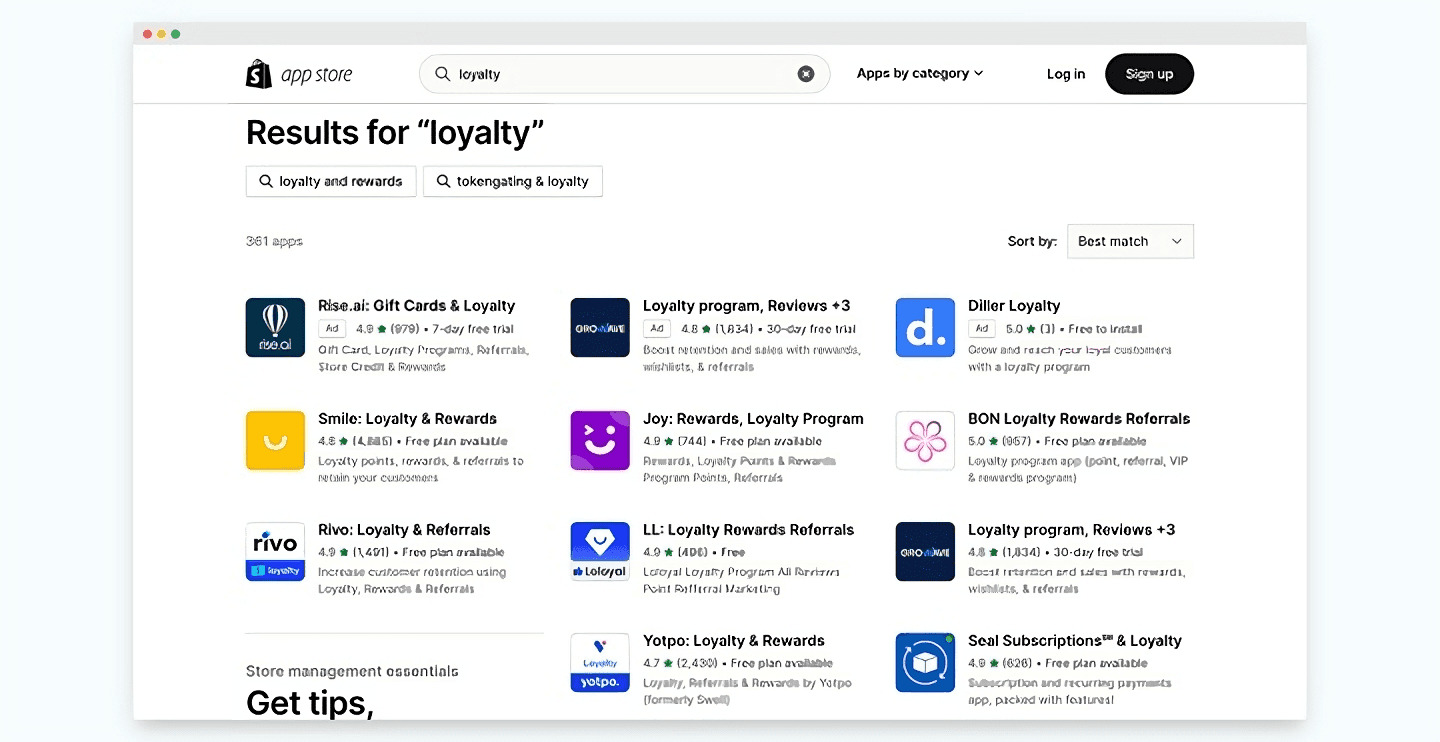
Personalize the customer experience
Personalization in e-commerce is an essential tool for creating tailored customer experiences to meet the unique needs and preferences of each individual customer. They can range from basic activities like addressing customers by name to more intricate experiences such as tailored product recommendations based on their past purchases or browsing habits. This can have a significant impact on customer retention.
Personalization in e-commerce is a powerful tool that savvy companies like Amazon and Stitch Fix are embracing with confidence. Amazon leverages purchase history, search history, and product views to deliver personalized product recommendations that are tailor-made for each customer. Similarly, Stitch Fix uses data and algorithms to provide customers with a selection of clothing and accessories that perfectly suits their style preferences and body type.
While going the Stitch Fix way might be tough for some merchants, there are Shopify apps such as Glood.ai, Optimonk, and Wiser to help you personalize the web experience.
Go above-and-beyond with customer service
Excellent customer service is essential to encourage repeat customers. Customers are more likely to return to a business if they feel appreciated and their needs are met. For online retail, this means promptly and effectively responding to inquiries and complaints, providing clear and precise product information, and ensuring a seamless and effortless checkout process.
There are three core areas where you must ensure you are providing excellent service:
Response times—One of the biggest pet peeves customers have with online retailers is slow response times. Customers expect prompt and helpful answers to their questions, and a slow response time can cause frustration and negatively impact their customer experience.
Inaccurate product information—Another common pet peeve is a lack of clear product information, such as inaccurate descriptions, missing product details, and misleading images.
Painful product returns—Communicate your return policies confidently and prominently on your website. This will help set customer expectations and eliminate confusion and frustration. Offer multiple return options, such as pre-paid shipping labels or in-store returns. Create a clear and straightforward process for processing returns, such as a self-service returns portal or a dedicated customer support team.
Create special offers for repeat customers
Promotions and discounts can be a great motivator for Shopify merchants to encourage repeat business and increase customer retention rate. Offering discounts, free shipping, or exclusive promotions can create urgency and incentivize existing customers to buy again. Merchants can also reward customers for loyalty with discounts on multiple purchases or a loyalty program with points redeemable for discounts.
Some examples of effective offers include:
Limited-time sales—Offering a discount on selected products for a set period of time can create a sense of urgency and encourage customers to make a purchase.
Loyalty program rewards—Offering rewards such as points or discounts to customers who have made multiple purchases can incentivize repeat purchases and foster customer loyalty.
Referral discounts—Offering discounts to customers who refer new customers to the store can help drive new business and encourage future purchases.
By offering promotions and discounts, Shopify merchants can create a compelling reason for customers to shop, encourage repeat purchases, and increase customer satisfaction. Additionally, you should use data to track the success of your promotions and make data-driven decisions about which promotions are most effective.
Airboxr helps you import all your coupon codes into a spreadsheet, like so:
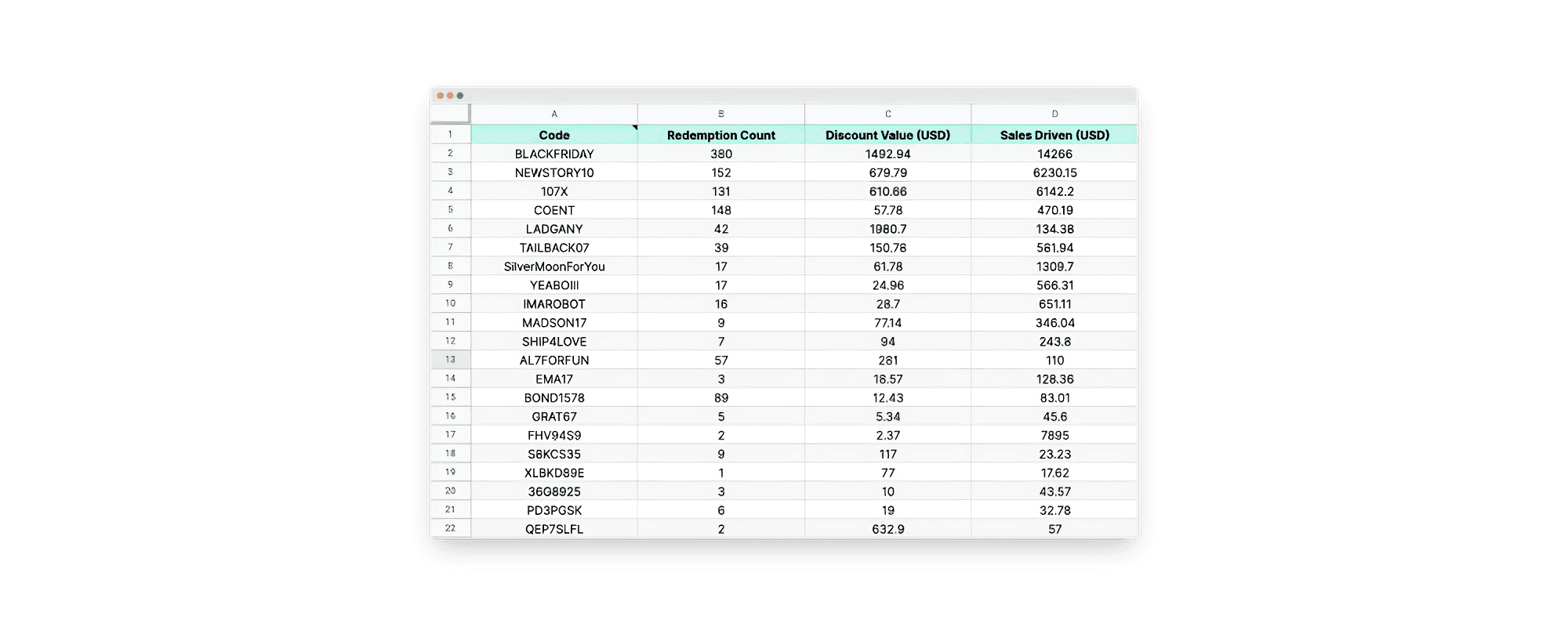
Improve your DTC game. Sign up for weekly tips.
Engage with customers to remain top-of-mind
Even when you offer incentives like the best discounts and loyalty benefits, you have to remain top-of-mind with your customers. They aren’t thinking of you 24/7. It is essential to engage with them over multiple channels—including social, email, and (if you have a mobile app) in-app notifications. There are three channels you can use:
Social media
These are the basics you should get right with your social media execution to keep on top of customer recall:
Respond to customer inquiries and comments on social media in a timely and professional manner. Your responses are seen not just by the customer you’re communicate with, but also others who view your page.
Share product updates, special promotions, and other exciting news with customers on social media.
Encourage customers to share their own experiences with the products they purchased by creating engaging content such as photos, short video clips created using a clip maker online, and testimonials. You can also explore tools like AI text to video or a CapCut alternative to speed up the content creation process, and use a video caption generator to make videos more accessible across social platforms.
Run social media contests and promotions to build customer engagement and incentivize repeat purchases.
Email marketing
Email marketing is a popular channel but it is becoming more difficult to stand out from the crowd. Marketing automation can help lighten the load. Here are some steps you should do:
Send personalized, targeted email campaigns to customers based on their purchase history and behavior.
Offer exclusive promotions and discounts to customers who sign up for your email list.
Send post-purchase follow-up emails to encourage customer feedback and reviews.
Use abandoned cart email campaigns to remind customers about items they left in their shopping cart and incentivize them to complete their purchase.
Airboxr helps you import your email flow performance into a spreadsheet, like so:
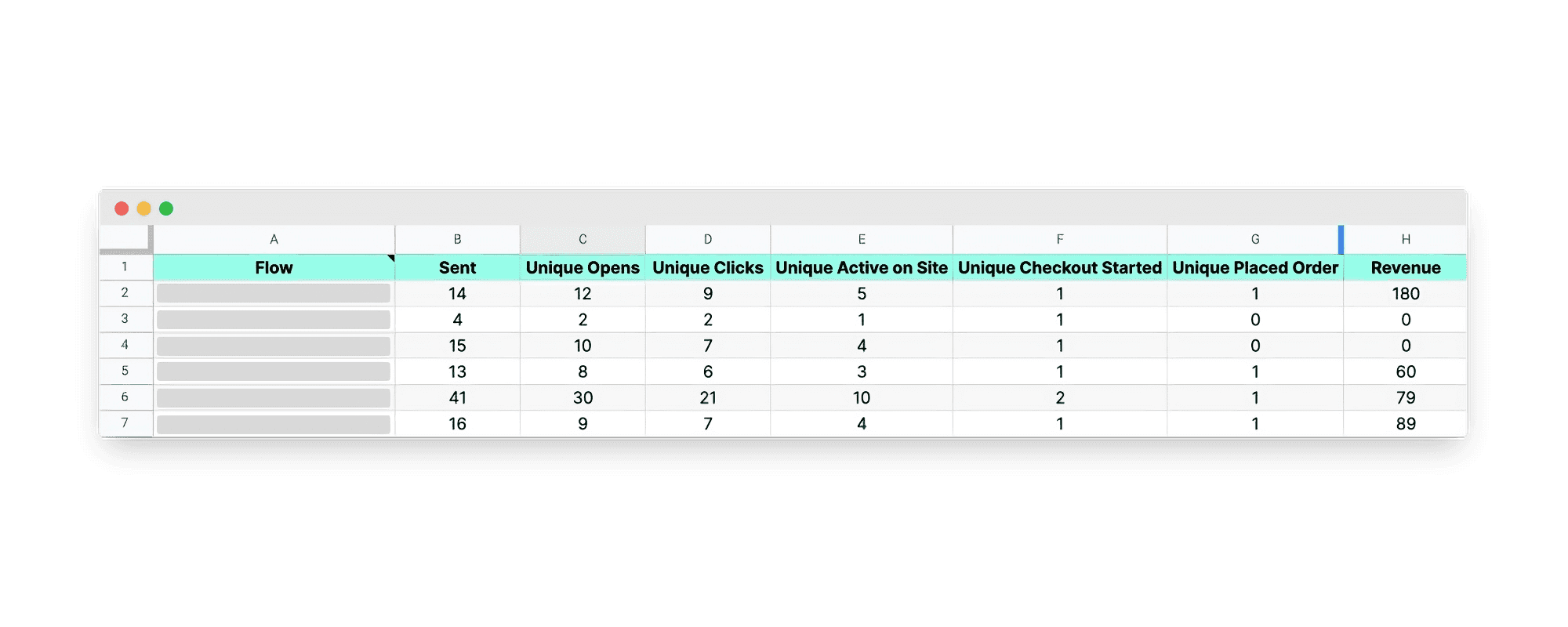
Use this Hop to find which of your email automations work best →
In-app notifications
In-app notifications are the best way to engage with your customers, but overdoing it may lead them to block your notifications. Consider the following steps with a regular (but not overwhelming) cadence:
Send personalized push notifications to customers about new products, promotions, and other exciting updates.
Use in-app notifications to remind customers about items they left in their shopping cart or to encourage them to complete a purchase.
Offer in-app exclusive promotions and discounts to incentivize customers to make a purchase.
Use in-app notifications to remind customers about upcoming sales or special events.
Keep track of your customer lifetime value
One metric you should always have your eye on is the customer lifetime value, which is often written as LTV. By knowing your customer LTV, you can accurately measure the impact of your work.
You can obtain your LTV through manual calculation, or use an app to have it calculated automatically for you.
Airboxr shows you your LTV in a widget on the dashboard, like so:
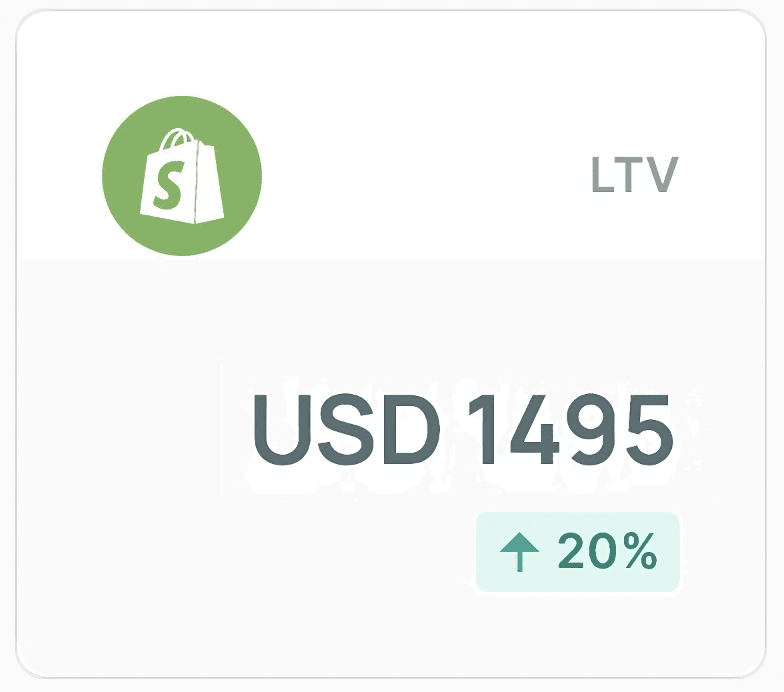
These steps are not exhaustive and there may be many other steps you can take to improve your customer retention strategies. Eventually it depends on your Shopify store’s customer lifetime value—the higher it is, the more you can afford to spend on acquiring new customers and engaging existing ones. If you don’t know your store’s customer lifetime value yet, log in to Airboxr to view it for your store now.
